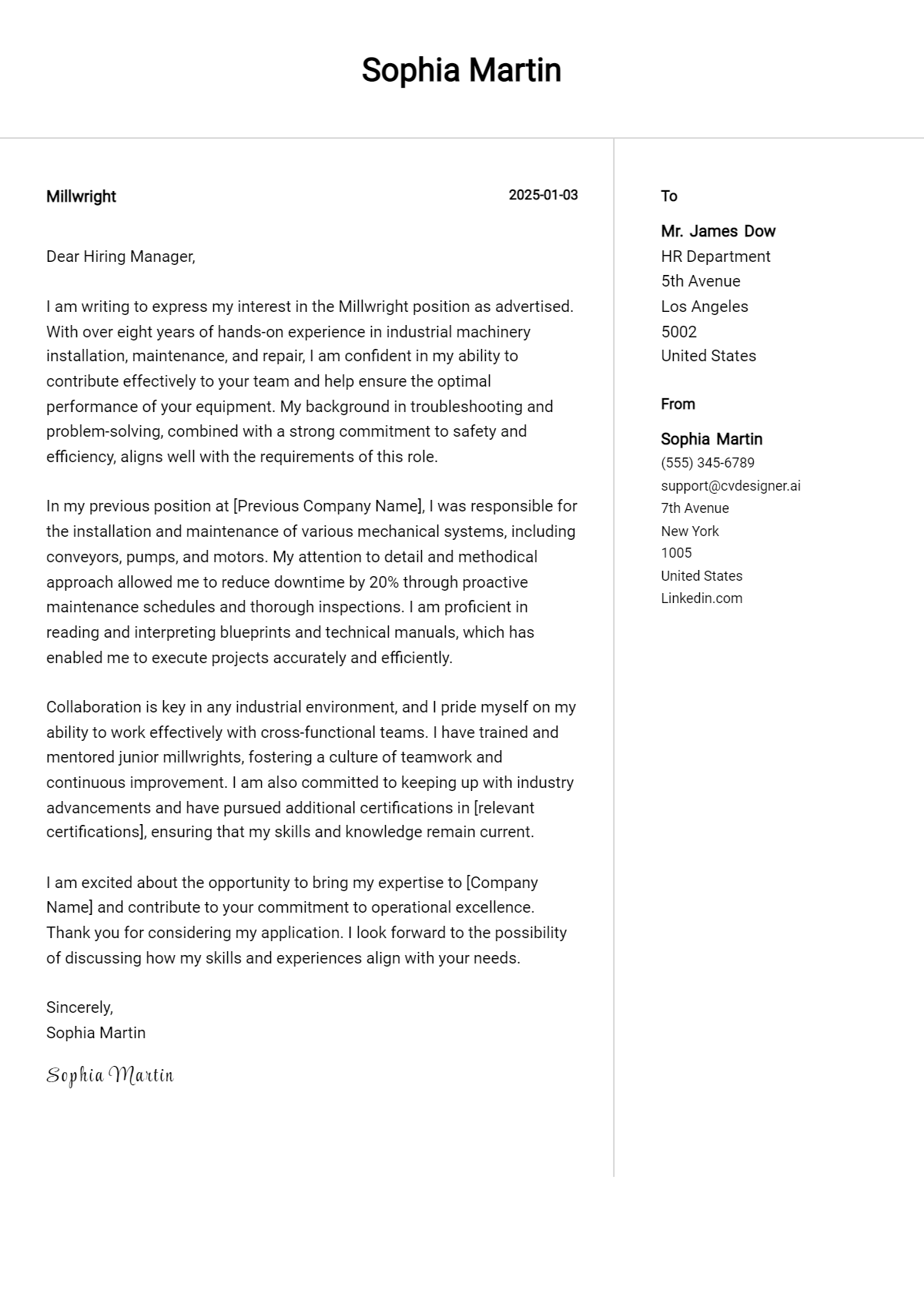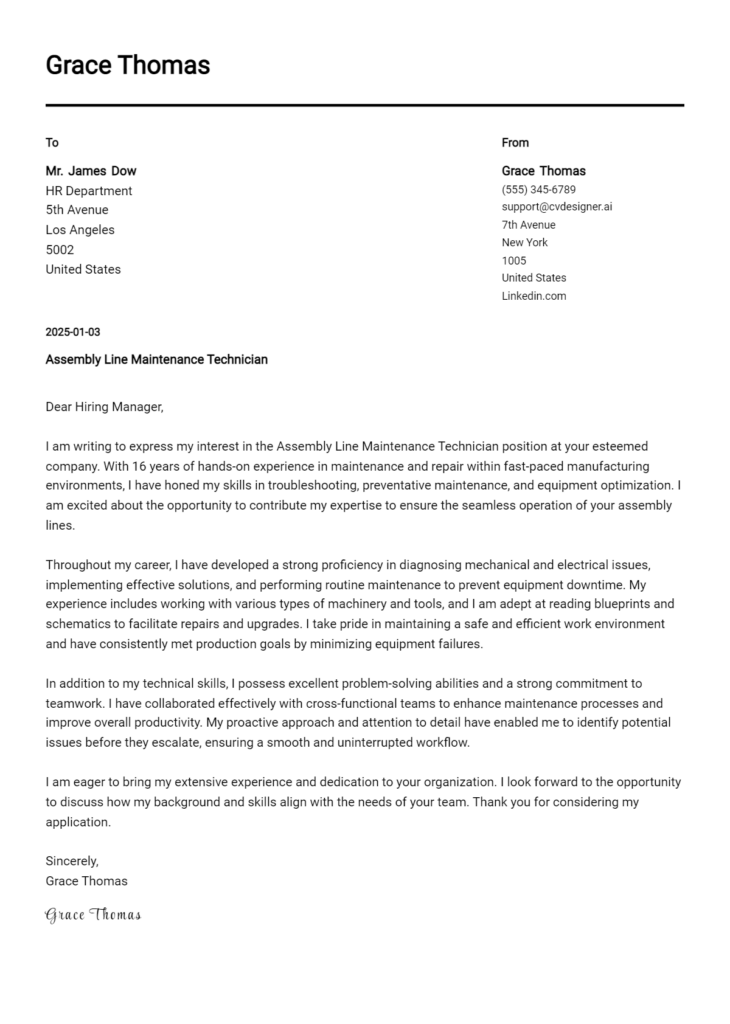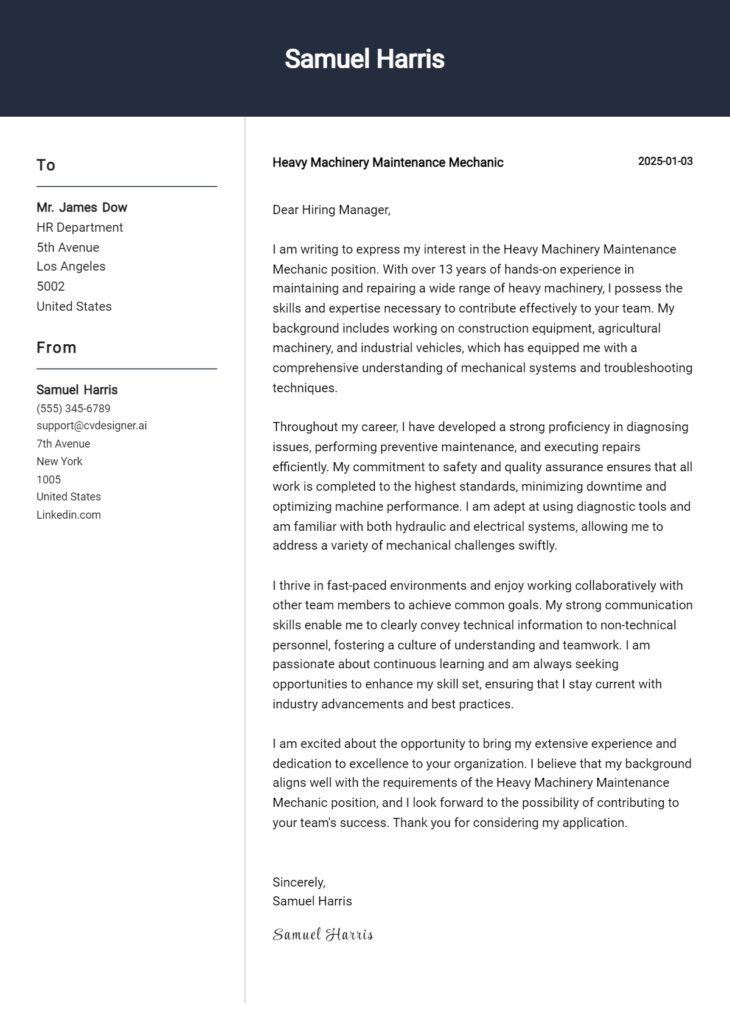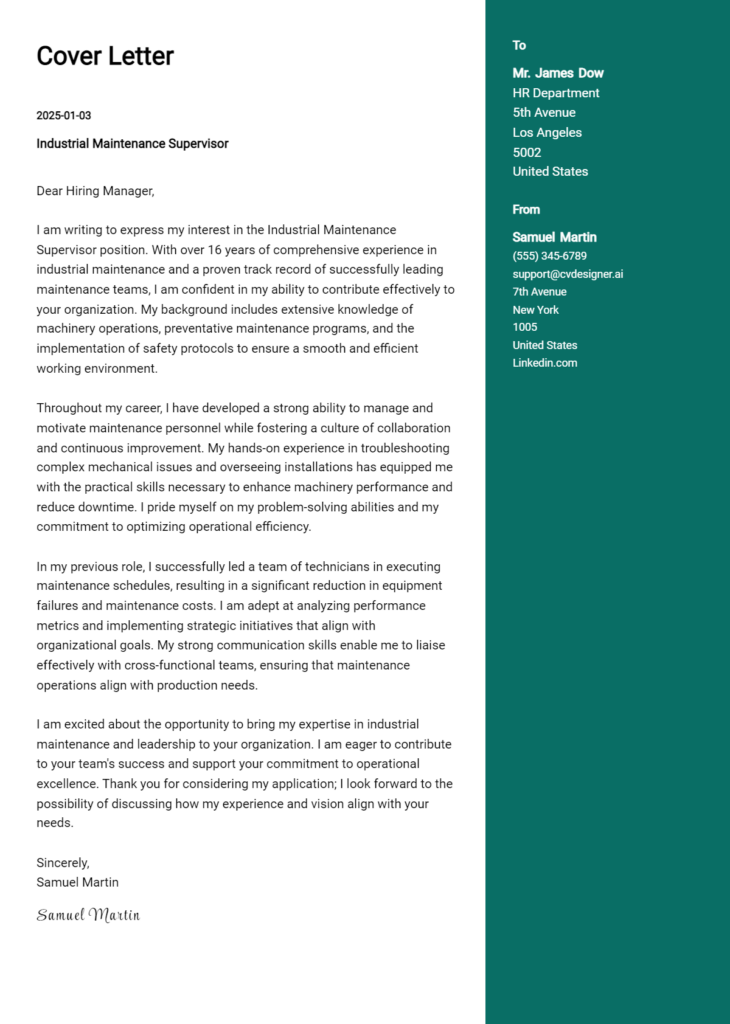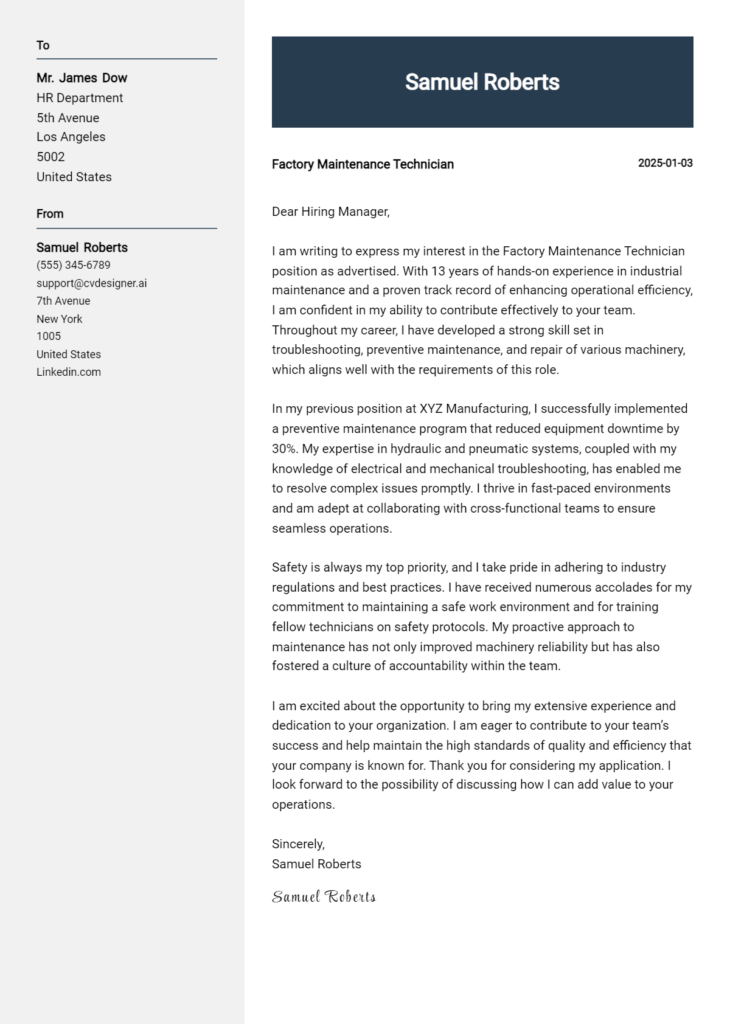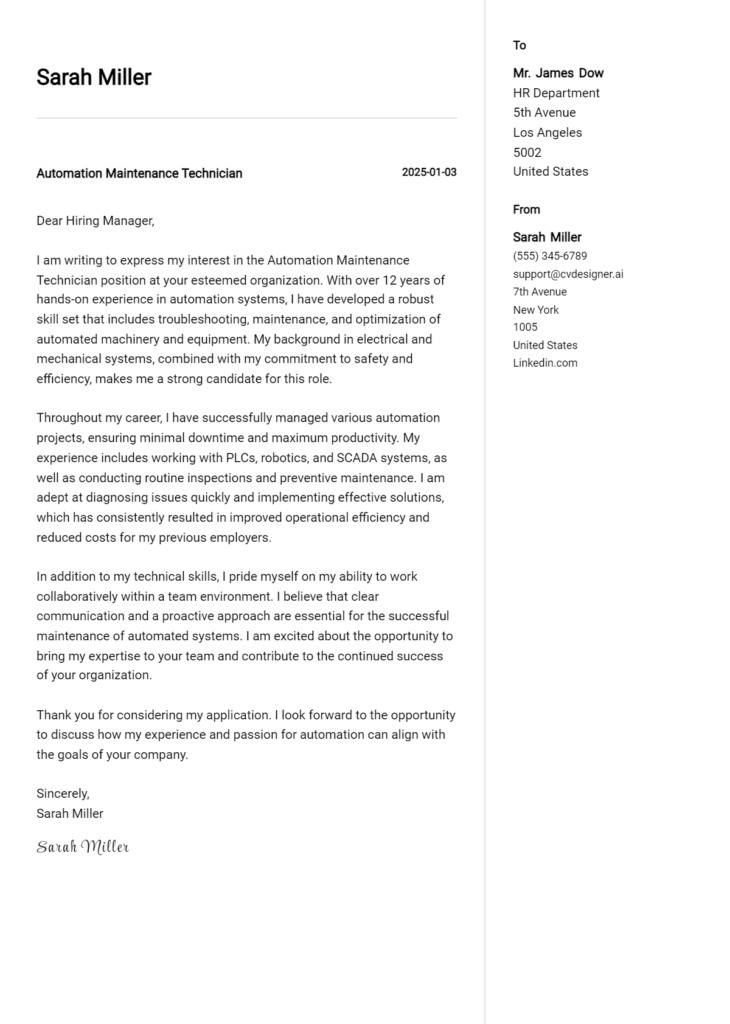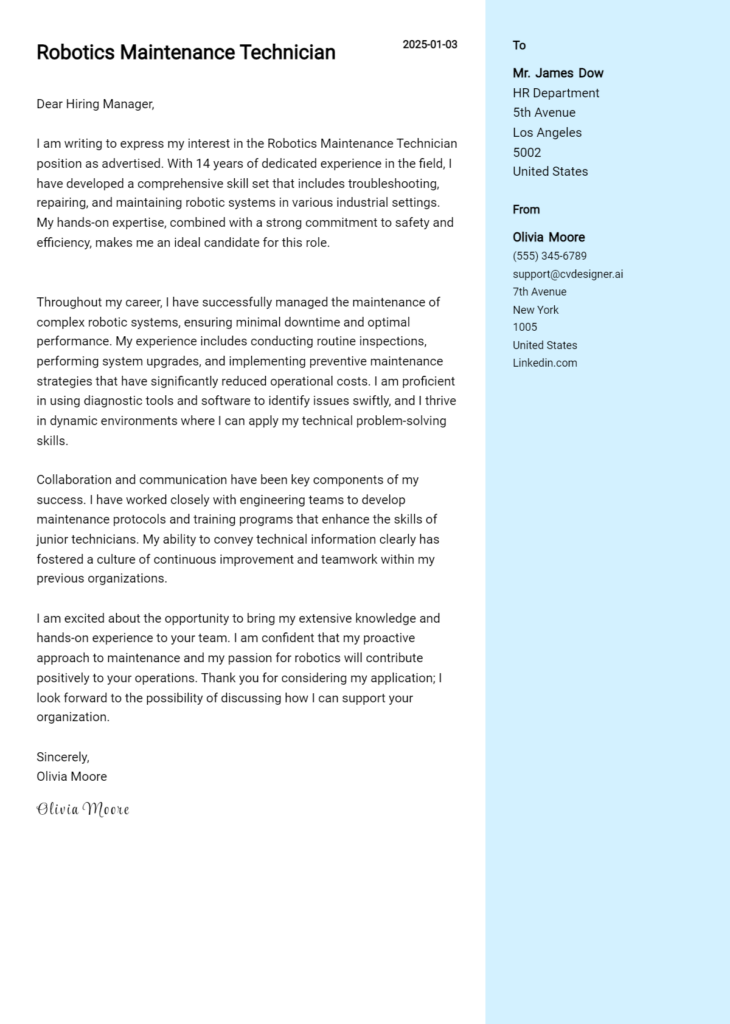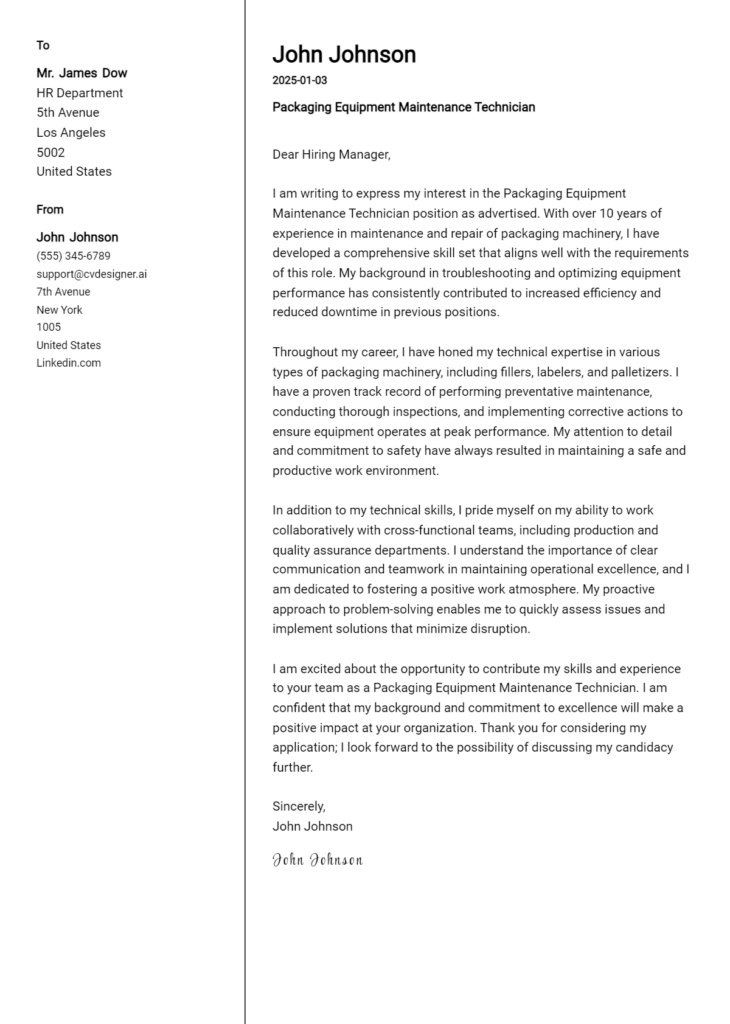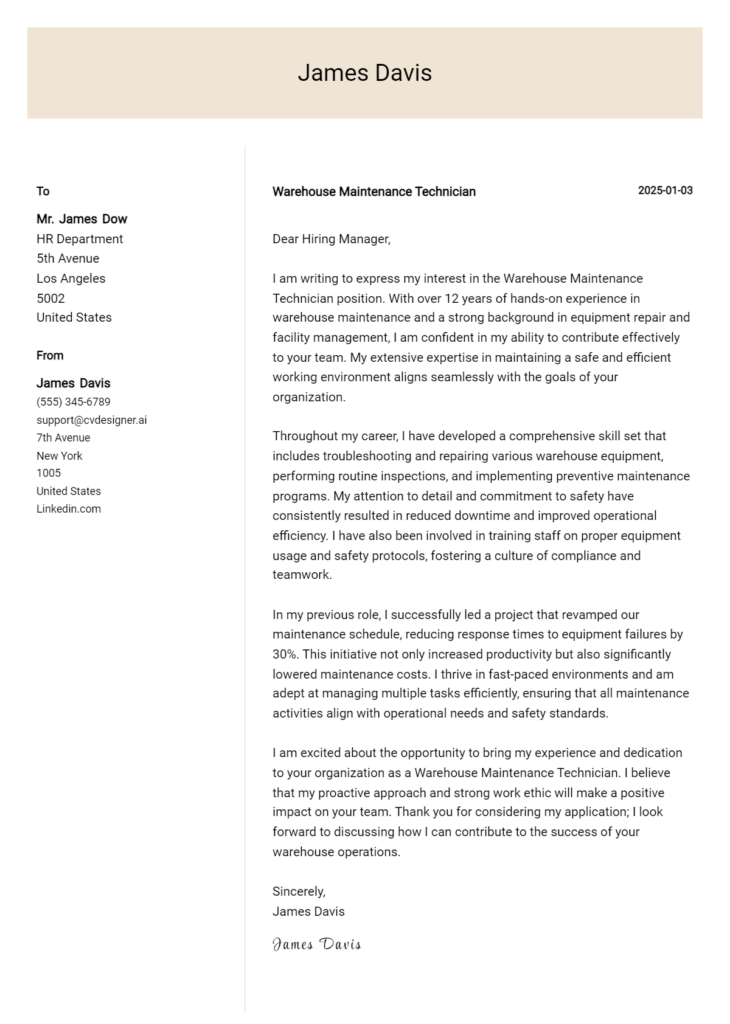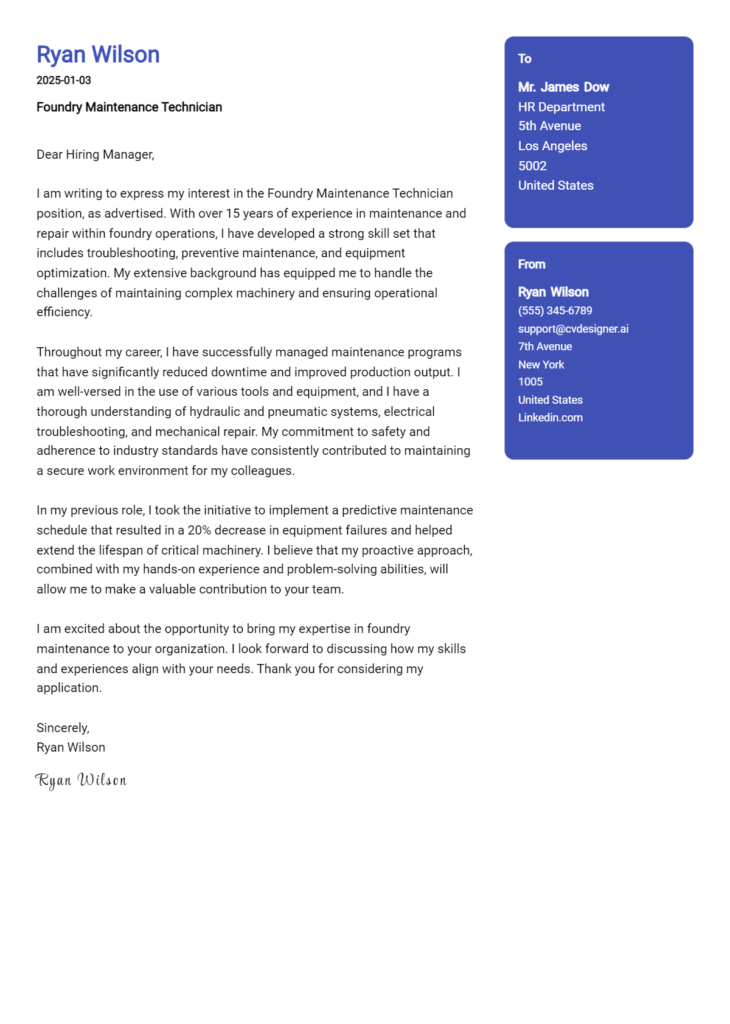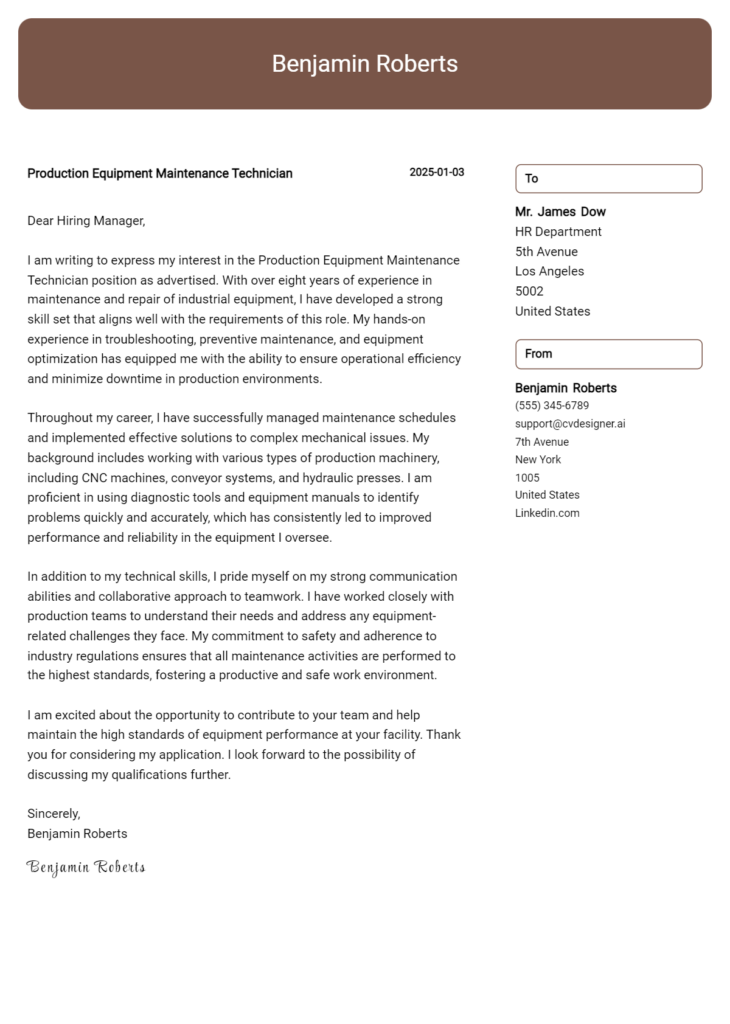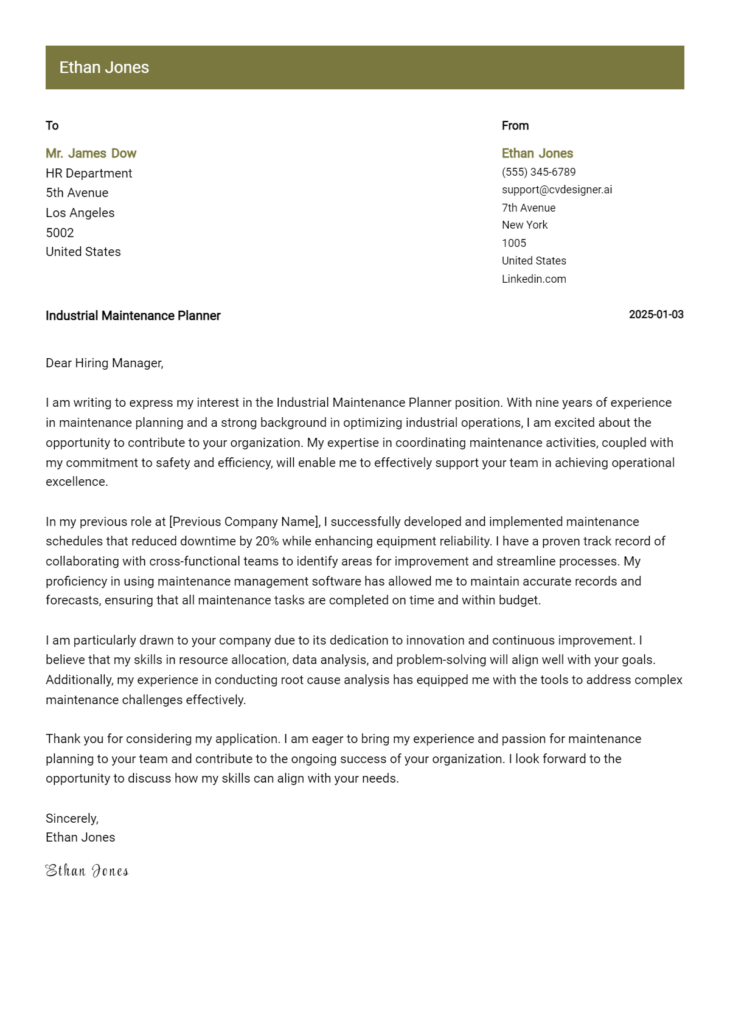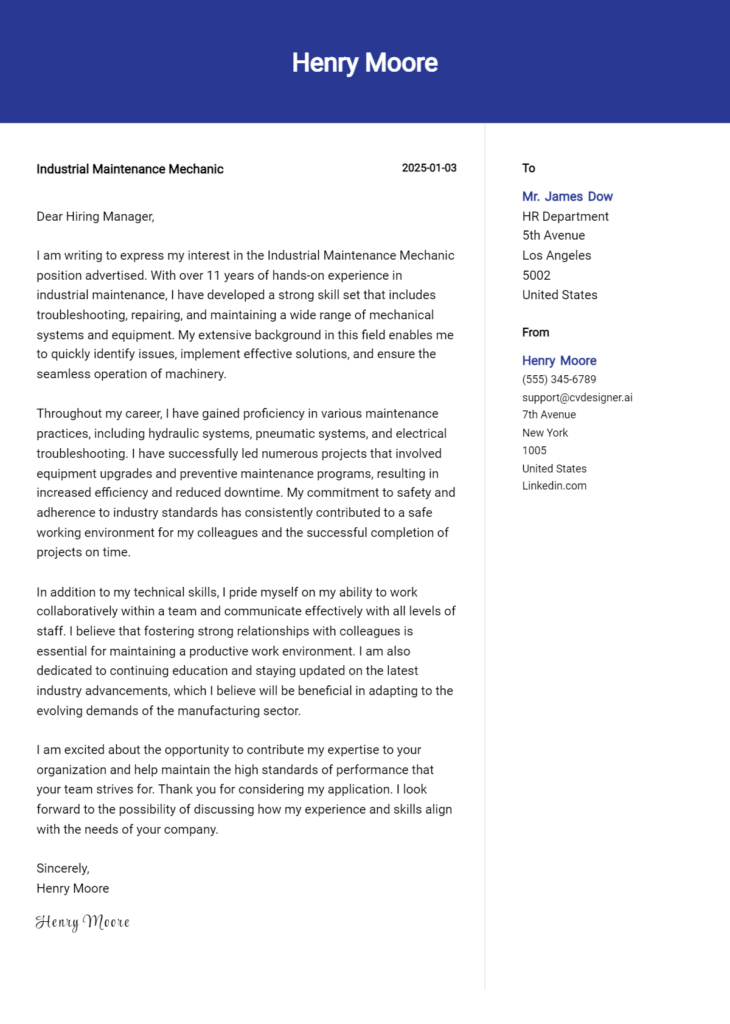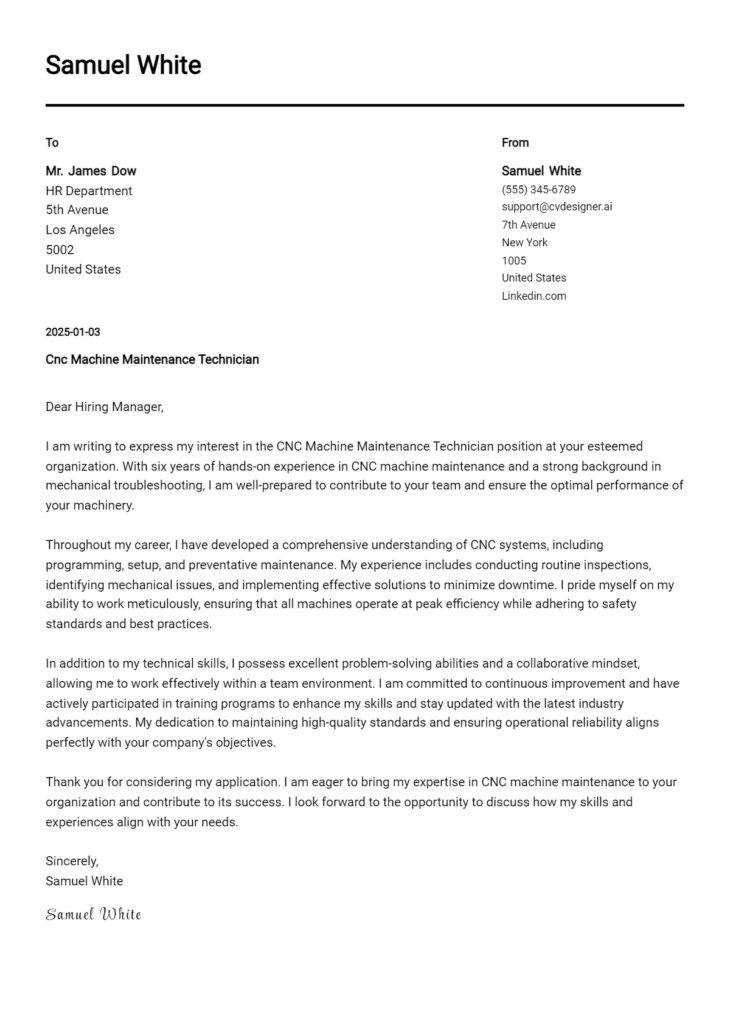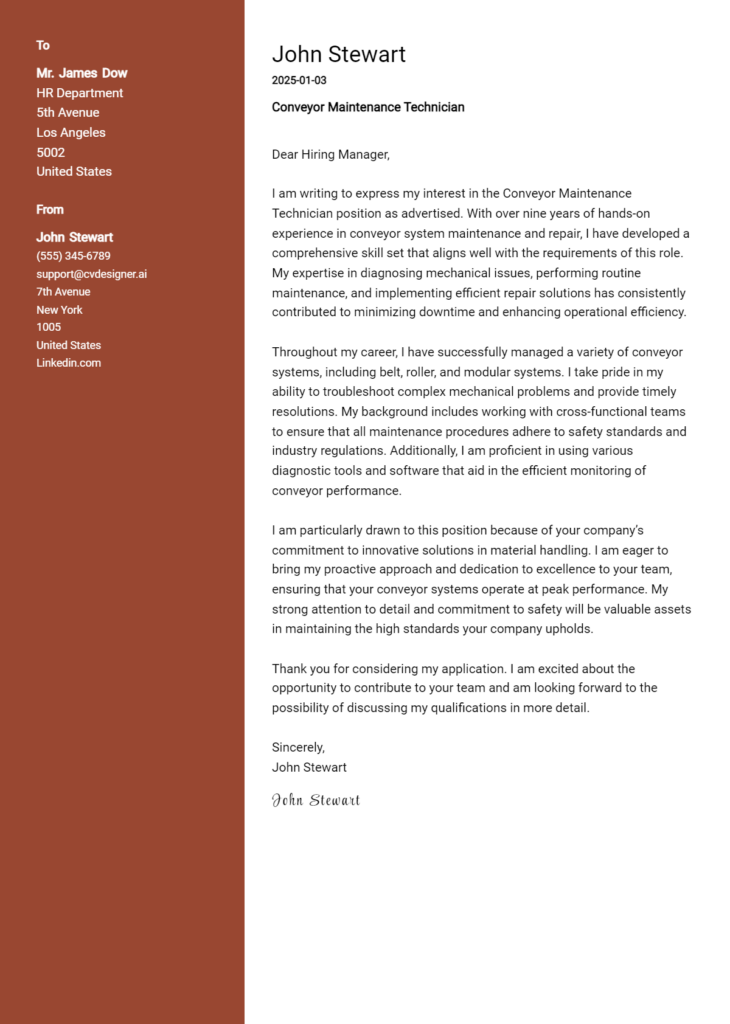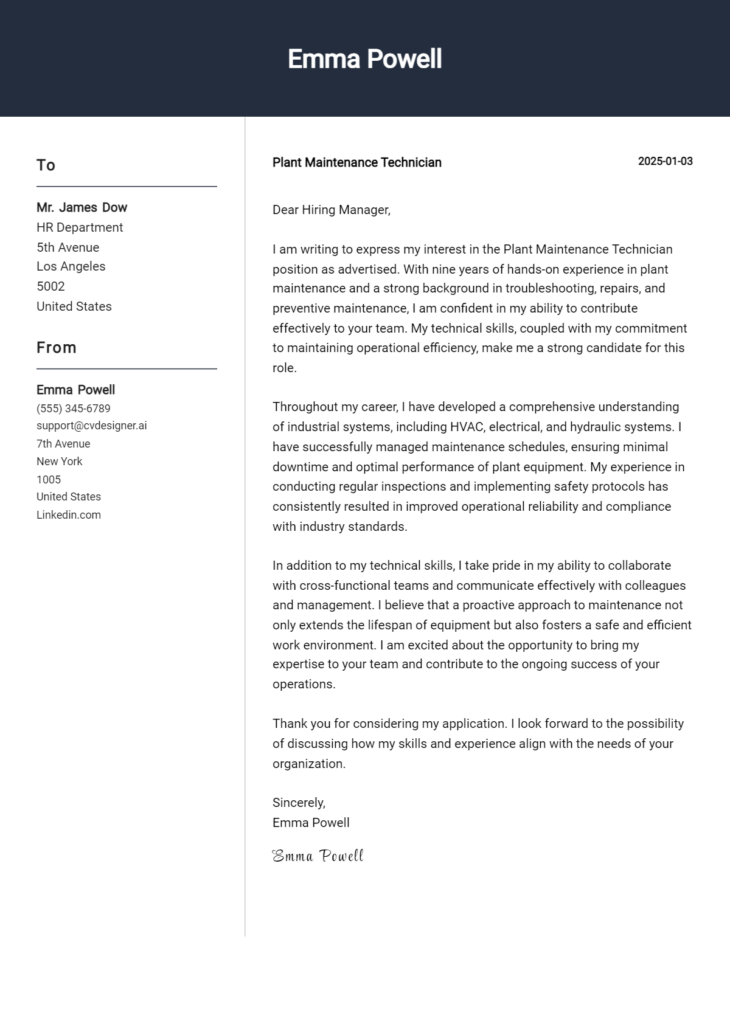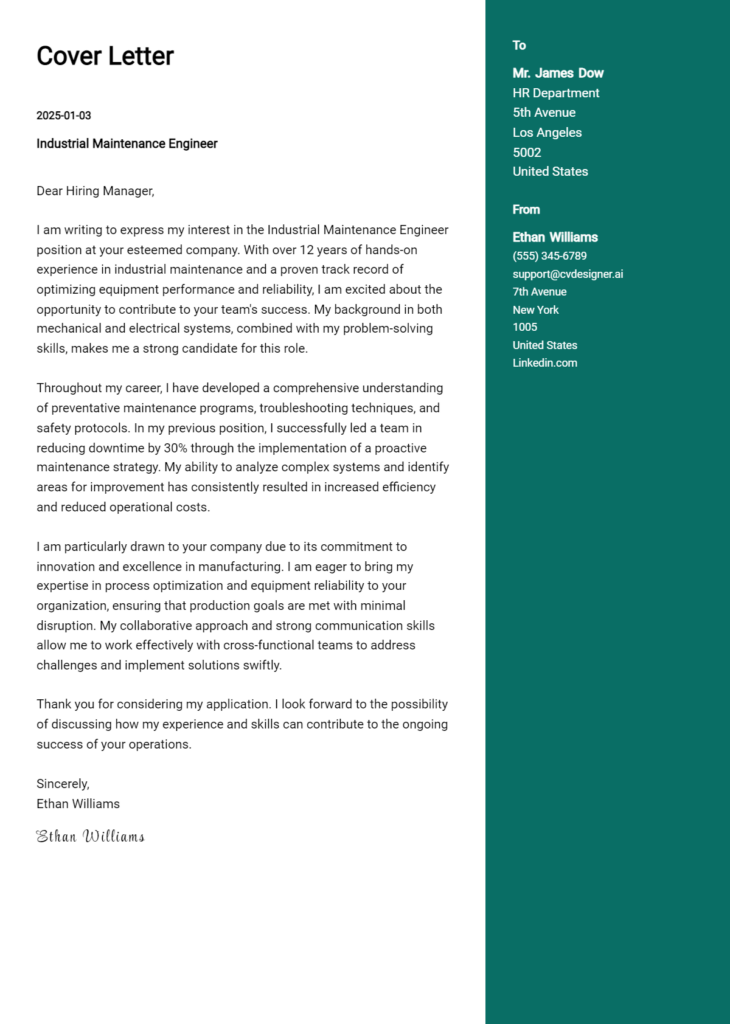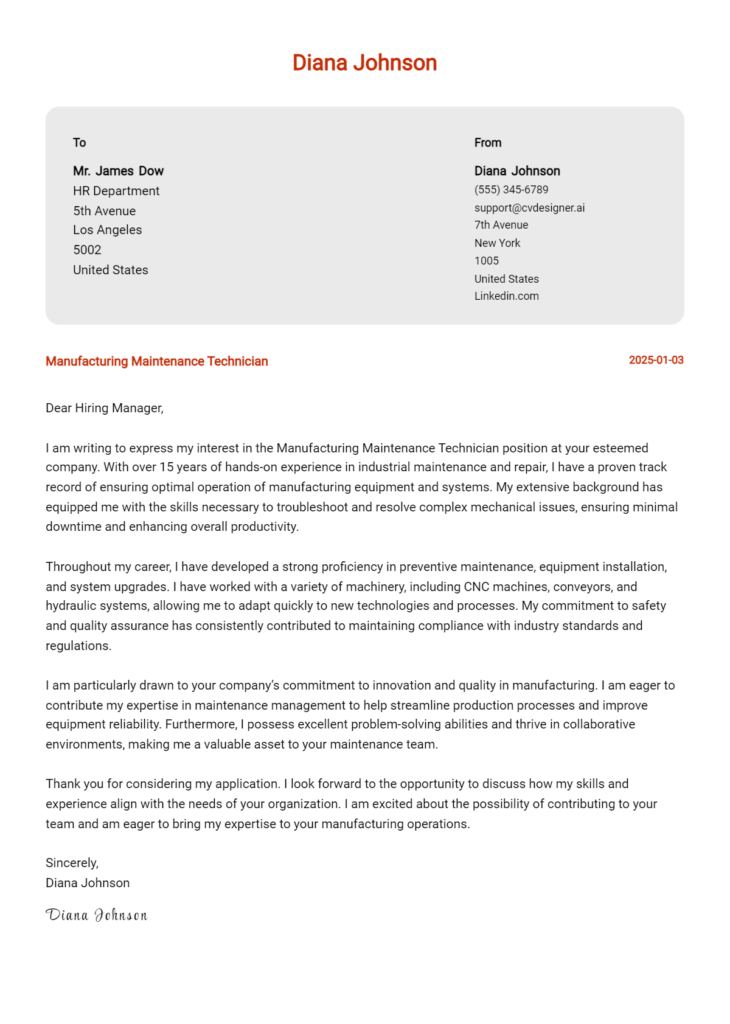Millwright Cover Letter Examples
Explore additional Millwright cover letter samples and guides and see what works for your level of experience or role.
How to Format a Millwright Cover Letter?
Crafting a well-structured cover letter is crucial for Millwrights, as it serves as a first impression of your technical skills and problem-solving abilities. The way you format your cover letter not only conveys your qualifications but also reflects your attention to detail—an essential trait in the Millwright profession. A clear and organized structure helps to capture the hiring manager's attention, allowing you to effectively communicate your expertise in machinery installation, maintenance, and repair.
In this guide, we'll outline how to format your Millwright cover letter, providing valuable insights and examples specific to the industry.
We'll focus on the essential components of a professional cover letter, including:
- Cover Letter Header
- Cover Letter Greeting
- Cover Letter Introduction
- Cover Letter Body
- Cover Letter Closing
Each section is vital for showcasing your qualifications and professionalism. Let’s break down each part and explain how to make your Millwright cover letter stand out.
The Importance of a Cover Letter Header for a Millwright
A well-structured cover letter header is crucial for a Millwright as it sets the tone for the entire application. It provides essential information at a glance, ensuring clarity and professionalism. The header should include your contact information, the date, and the recipient's details. This not only makes it easy for the employer to get in touch with you but also demonstrates your attention to detail—a vital trait for a Millwright who often works on complex machinery and systems. A clear and professional header reflects your organizational skills and respect for the hiring process.
Strong Example
John Doe 123 Industrial Lane Mechanicville, NY 12345 (555) 123-4567 johndoe@email.com October 1, 2023 Mr. James Smith Hiring Manager ABC Manufacturing 456 Factory Road Mechanicville, NY 12345
Weak Example
John D. Mech. St. 555-1234 johndoe@email 1/10/23 To Whom It May Concern
The Importance of a Strong Cover Letter Greeting for Millwrights
The greeting of your cover letter serves as the first impression to a potential employer, setting the tone for the entire document. A well-crafted greeting demonstrates professionalism and shows that you have taken the time to personalize your application by addressing the hiring manager directly. This small yet significant touch can differentiate you from other candidates who may opt for a more generic approach. To make a positive impact, it’s crucial to avoid generic greetings such as "To Whom It May Concern." Instead, research the name of the hiring manager or relevant contact person, if possible, to create a more meaningful connection.
Here are some examples to illustrate the difference between strong and weak greetings for a Millwright cover letter.
Strong Greeting Example
Dear Mr. Johnson,
Weak Greeting Example
To Whom It May Concern,
The Importance of a Compelling Cover Letter Introduction for a Millwright
A well-crafted cover letter introduction is crucial for a Millwright as it serves as the first impression to the hiring manager. This opening paragraph should effectively capture attention, convey genuine interest in the position, and succinctly highlight the candidate’s relevant skills or achievements. A strong introduction sets the tone for the rest of the letter, demonstrating professionalism and enthusiasm, while a weak introduction can fail to engage and may leave the hiring manager wanting more.
Strong Example
Dear [Hiring Manager's Name], As a dedicated Millwright with over five years of hands-on experience in industrial maintenance and equipment installation, I am excited to apply for the Millwright position at [Company Name]. My proven track record of successfully troubleshooting and optimizing mechanical systems has equipped me with the skills necessary to contribute effectively to your team. I am particularly impressed by [specific project or value of the company], and I look forward to bringing my expertise in precision maintenance and safety protocols to [Company Name].
Weak Example
To whom it may concern, I am writing to apply for the Millwright job. I think I can do the work, and I have some experience with machines. I hope you consider my application.
Purpose of the Cover Letter Body for a Millwright
The body of a cover letter for a Millwright serves as a critical platform for candidates to articulate their specialized skills and relevant experiences, thereby demonstrating their potential value to prospective employers. This section allows candidates to highlight specific projects or accomplishments that showcase their technical expertise, problem-solving abilities, and commitment to safety and efficiency. By detailing past experiences, such as successful machinery installations or complex repairs completed under tight deadlines, candidates can effectively illustrate their qualifications and how they align with the company's objectives.
Strong Example
Dear Hiring Manager, I am excited to apply for the Millwright position at [Company Name]. With over five years of experience in industrial maintenance and a proven track record of successful machinery installations, I am confident in my ability to contribute effectively to your team. At my previous role with [Previous Company Name], I led a project to overhaul a critical production line, resulting in a 20% increase in efficiency and a significant reduction in downtime. My expertise in troubleshooting complex mechanical issues and my commitment to safety protocols have consistently earned me commendations from management. I am eager to bring my skills in precision alignment and hydraulic systems to [Company Name] and help drive continued operational excellence. Sincerely, [Your Name]
Weak Example
Dear Hiring Manager, I am writing to apply for the Millwright position. I have some experience in the field and can work on machines. I fixed a few things at my last job, and I think I can help your company. I am interested in this position because I need a job. I hope we can talk more about it. Best, [Your Name]
Importance of the Cover Letter Closing for a Millwright
The closing paragraph of a cover letter is crucial for a Millwright as it serves to summarize key qualifications, express enthusiasm for the position, and prompt the hiring manager to take the next steps, such as reviewing the resume or scheduling an interview. A strong closing leaves a lasting impression and reinforces the candidate's suitability for the role, while a weak closing may diminish the overall impact of the application. Below are examples of both strong and weak cover letter closings for a Millwright position.
Strong Example
Thank you for considering my application for the Millwright position. With my extensive experience in machinery troubleshooting and repair, coupled with a commitment to safety and efficiency, I am excited about the opportunity to contribute to your team. I am keen to discuss how my skills align with your needs and would welcome the chance to further elaborate on my qualifications in an interview. Please feel free to contact me at your earliest convenience to schedule a meeting. I look forward to the possibility of working together.
Weak Example
Thanks for looking at my letter. I hope I get the job. You can check my resume for details. I might be available for an interview if you want to talk.
Writing a compelling cover letter is essential for Millwright candidates looking to stand out in a competitive job market. An effective cover letter not only showcases your technical skills but also highlights your problem-solving abilities, knowledge of the Systems Development Life Cycle (SDLC), teamwork experience, and a commitment to continuous learning. These tips will guide you in crafting a cover letter that makes a strong impression and aligns with what employers are seeking.
Cover Letter Writing Tips for Millwright
Highlight Technical Skills
Clearly outline your technical skills relevant to the Millwright role. Mention specific machinery or systems you are experienced with, such as hydraulics, electrical systems, or CNC machinery. Use concrete examples to demonstrate your proficiency and how it has contributed to past projects. For instance, you might say, "In my previous role, I successfully maintained and repaired a fleet of CNC machines, reducing downtime by 30%."Showcase Problem-Solving Abilities
Employers value candidates who can troubleshoot and resolve issues efficiently. Share a specific instance where you faced a challenge in your work and explain how you approached it. Highlight your analytical thinking and resourcefulness. For example, "When faced with a recurring mechanical failure, I conducted a root cause analysis and implemented a preventive maintenance program that improved overall machinery reliability."Demonstrate SDLC Knowledge
If applicable, mention your familiarity with the Systems Development Life Cycle, especially if you have experience in industries that integrate technology with machinery. Discuss how your understanding of SDLC processes has helped you in project management or system upgrades. For example, "My participation in the SDLC for a factory automation project allowed me to streamline processes, enhancing production efficiency by 15%."Emphasize Teamwork Experience
Millwrights often work as part of a team, so it’s crucial to illustrate your ability to collaborate effectively. Mention your experience working alongside other tradespeople or departments, emphasizing how teamwork led to successful project outcomes. You might state, "Collaborating with electricians and engineers on a major overhaul project, we completed the task ahead of schedule, showcasing our ability to work harmoniously under pressure."Express a Passion for Continuous Learning
The field of mechanical maintenance is constantly evolving, and employers appreciate candidates who are committed to ongoing education and skill development. Mention any certifications, training programs, or workshops you have attended. You could write, "I am dedicated to staying updated with industry trends and have recently completed a certification in advanced hydraulic systems to enhance my technical capabilities."
By following these tips and integrating them into your cover letter, you can create a strong presentation of your qualifications for a Millwright position. For further assistance, consider utilizing cover letter templates or a cover letter builder to refine your document and ensure it meets professional standards.
Common Mistakes to Avoid in a Millwright Cover Letter
Avoiding common mistakes in your cover letter is crucial for standing out in the competitive field of millwrights. A well-crafted cover letter can significantly enhance your chances of landing an interview. However, many candidates make errors that can undermine their efforts. Here are some common pitfalls to avoid:
Generic Language: Using a one-size-fits-all approach can make your cover letter seem insincere. Tailor your letter to the specific job and company by mentioning relevant skills and experiences.
Neglecting Formatting: A poorly formatted cover letter can be off-putting. Ensure you follow a professional cover letter format that includes clear sections and readable fonts.
Ignoring Job Requirements: Failing to address the specific qualifications mentioned in the job listing can make your application seem irrelevant. Always align your skills with the requirements of the position.
Overly Lengthy Content: A cover letter should be concise. Aim for a length of about one page to keep the reader's attention. Focus on key achievements relevant to the millwright role.
Lack of Enthusiasm: Not conveying genuine interest in the position can be a major turn-off. Make sure to express your passion for the trade and the specific company.
Spelling and Grammar Errors: Mistakes in your cover letter can create a negative impression. Always proofread your work or ask someone else to review it before submission.
Failure to Include a Call to Action: Leaving your cover letter without a strong closing statement can miss the opportunity to prompt a follow-up. Conclude with a statement expressing your eagerness to discuss your qualifications further.
For inspiration, consider reviewing some cover letter examples to see what works best in showcasing your skills and experiences effectively.
Cover Letter FAQs for Millwright
What should I include in my cover letter as a Millwright?
In your cover letter, you should focus on your relevant skills, experiences, and certifications that pertain specifically to millwright work. Highlight your expertise in installing, repairing, and maintaining machinery and equipment. Mention any specific machinery or systems you have worked with and any safety protocols you follow. Be sure to include your technical qualifications, such as your apprenticeship experience or any relevant certifications like a Journeyman Millwright License. Additionally, convey your problem-solving skills and your ability to work in a team, as these are crucial in a millwright role. Tailor your cover letter to the specific job description, using keywords from the posting to demonstrate your alignment with the employer's needs.
How long should my cover letter be?
Your cover letter should ideally be one page long, which typically translates to about three to four paragraphs. This length allows you to succinctly present your qualifications without overwhelming the reader. Start with a strong opening that grabs attention, followed by a brief introduction of your background and experience relevant to the millwright position. In the body, elaborate on specific skills and achievements that make you a strong candidate. Conclude with a call to action, expressing your desire for an interview and your enthusiasm for the opportunity. Remember, clarity and conciseness are key, so focus on the most impactful information to keep the reader engaged.
Should I address my cover letter to a specific person?
Yes, it is highly recommended to address your cover letter to a specific person whenever possible. This adds a personal touch and demonstrates your initiative in researching the company. If the job posting does not include a name, you can often find the hiring manager's details on the company's website or LinkedIn. If you still cannot find a specific name, you can use a general greeting such as "Dear Hiring Manager." Avoid using overly generic salutations like "To Whom It May Concern." A personalized approach shows that you are genuinely interested in the position and have taken the time to make your application stand out.
How can I make my cover letter stand out for a Millwright position?
To make your cover letter stand out, start by crafting a compelling opening statement that reflects your passion for the trade and your commitment to safety and quality work. Incorporate specific examples of past projects or accomplishments, such as successful machinery installations, troubleshooting complex systems, or leading a team during a critical repair. Utilize metrics where possible, such as improving efficiency or reducing downtime. Additionally, emphasize any continuous education or training you've pursued, showcasing your dedication to staying current in the field. Tailor your cover letter to the specific job description, ensuring you address the unique needs and culture of the company, which will help you resonate more with the hiring manager.
Build your Cover Letter in minutes
Use an AI-powered cover letter builder and have your letter done in 5 minutes. Just select your template and our software will guide you through the process.

